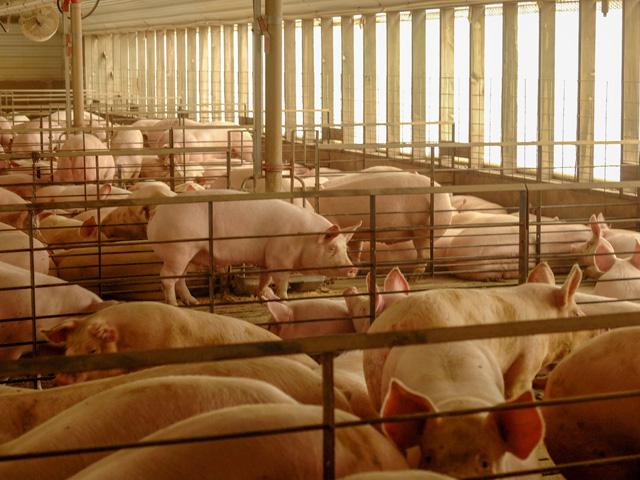Mass. Wants Question 3 Suit Dismissed
Massachusetts: Companies Fail to Prove Damage From Animal Welfare Law
LINCOLN, Neb. (DTN) -- The state of Massachusetts asked a federal court to dismiss a lawsuit challenging the state's animal welfare law, saying in a motion this week that the plaintiff food companies have proven no harm from complying with the law.
The Prevention of Farm Animal Cruelty Act came about after Massachusetts voters supported the 2016 ballot initiative known as Question 3.
The law took effect in June 2022, and on the heels of a Supreme Court ruling that upheld California's Proposition 12, a group of farms, food and processing companies in July 2023 asked the U.S. District Court for the District of Massachusetts to halt enforcement of the law.
The farms and pork processors filing legal action include Triumph Foods LLC, Christensen Farms Midwest LLC, The Hanor Company of Wisconsin LLC, New Fashion Pork LLC, Eichelberger Farms Inc. and Allied Producers' Cooperative. Thirteen states have also joined the lawsuit.
"For the court to have jurisdiction under Article III of the U.S. Constitution, a plaintiff must demonstrate that it has suffered an injury in fact that is concrete, particularized and actual or imminent," Massachusetts said in the motion.
"Plaintiff Triumph Foods LLC has not made this demonstration. While Massachusetts customers have bought millions of pounds of Triumph product, all sales of Triumph product are controlled by Seaboard Foods LLC, a non-party, under an agreement between Triumph and Seaboard executed in 2004 and attached hereto."
The state said that so far, Triumph has not shown the state's law prevents the company from meeting its contract obligations.
In 2022, Triumph processed over 11 million pounds of pork meat, according to the motion, although it's not clear how much of that pork complied with the law.
P[L1] D[0x0] M[300x250] OOP[F] ADUNIT[] T[]
"Importantly for the purposes of standing, Triumph has stipulated that 'Triumph's products continue to be sold into Massachusetts today, including product that is compliant with the act,'" according to the motion.
"Triumph raises the specter of enforcement under the act against it. It is purely speculative, however, whether enforcement action would be taken against Triumph under the circumstances Triumph has thus far presented."
According to court documents, Triumph has implemented "physical segregation procedures" as well as tracking and inventory tools, sorting procedures and inventory management to track compliant supplies.
"Under these circumstances, Triumph's alleged injury from risk of enforcement is a hypothetical issue," the state said this week.
The motion said the company has not proven it has standing to file the lawsuit as "Triumph's operations are plainly geared primarily to compliance with California's law (Proposition 12)."
Thirteen states signed on to an amicus brief in support of the companies, including Iowa, Louisiana, Mississippi, Missouri, Montana, Nebraska, New Hampshire, North Dakota, Oklahoma, South Carolina, South Dakota, Utah and Wyoming.
Massachusetts's law makes it illegal to sell whole pork meat in the state if it comes from farms where animals were "confined in a cruel manner."
While the law facially appears to regulate just the sales of pork in Massachusetts, the 13 states have said it has a much broader effect on farms and companies across the country.
The states point to Iowa's pork industry to show what they say could be an economic hit to states as a whole from the law.
In 2020, Iowa's pork industry contributed about $40.8 billion to the state's economy, according to a filed brief by the states. Iowa had 5,400 pig farms and housed about one-third of all hogs in the U.S.
The states said that as is the case with Proposition 12, the Massachusetts law will hurt small, independent hog producers the most because of the costs to comply.
California accounts for about 13% of all pork consumption in the U.S., at 2.7 billion pounds annually, whereas Massachusetts consumes about 2% of all U.S. pork.
Though the Massachusetts law likely affects a smaller segment of all U.S. pork producers than Proposition 12, the farms filing the lawsuit argue the act violates the Constitution by regulating farms in other states.
Read more on DTN:
"13 States Join Animal Law Fight," https://www.dtnpf.com/…
Todd Neeley can be reached at todd.neeley@dtn.com
Follow him on X, formerly known as Twitter, @DTNeeley
(c) Copyright 2023 DTN, LLC. All rights reserved.






